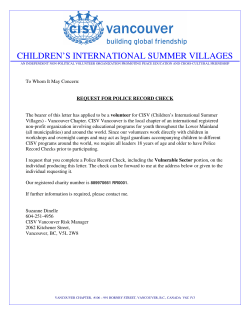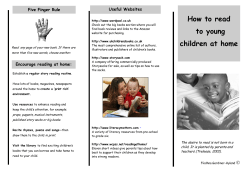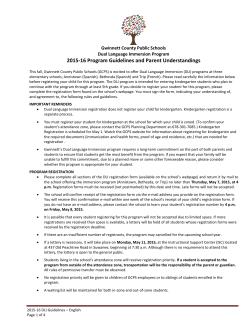
PARENT SURVIVAL NIGHT for Grades 2-4 in French Immersion
PARENT SURVIVAL NIGHT for Grades 2-4 How to help your child succeed in French Immersion Presented by Sallie Boschung 3/22/2010 HOSTED BY THE CANADIAN PARENTS FOR FRENCH VANCOUVER EAST, NORTH AND SOUTH CHAPTERS Table of Contents The Structure of a French Immersion Program ........................................................................................ 3 Select a book appropriate to your child’s reading level ............................................................................ 3 Tips and suggestions to help you choose a book for your child............................................................. 3 The 5 Finger Rule ................................................................................................................................. 3 A Parent’s Role in Reading Development ................................................................................................. 4 What if my child does not like reading? ................................................................................................... 4 English and French Reading ..................................................................................................................... 5 The Homework Battle .............................................................................................................................. 5 Location .............................................................................................................................................. 5 Getting Started .................................................................................................................................... 5 F I G H T P R O C R A S T I N AT I O N! .................................................................................................. 5 Organizational Checklist ...................................................................................................................... 5 Ways to Help with Writing.... ................................................................................................................... 6 Writing Strategies .................................................................................................................................... 6 Links ........................................................................................................................................................ 6 The Canadian Parents for French ............................................................................................................. 7 2 The Structure of a French Immersion Program How and When Do the Students Learn English? Transition: Primary to Intermediate A double Language Arts program means developing more independent and cooperative learning skills. Letter grades as well as the usual anecdotal comments are given in report cards. In the case of a Grade 3/4 combined class, the percentage in each language and the subject distribution will vary each year according to available resources and the needs of the students. Basic computational skills should be mastered (addition and subtraction facts, as well as basic multiplication and division). Additional programming (band, strings, technology, ...) and specialized teaching require more independence and greater personal organization from the student. They are expected to be punctual, and to keep track of their own textbooks, supplies, instruments, gym clothes, deadlines, etc. for each one of their teachers on the appropriate days. Findings from French Immersion research show that the foundation of second language literacy is reading in your first language, Select a book appropriate to your child’s reading level Tips and suggestions to help you choose a book for your child Reading at home should be fun and enjoyable. Consult with your child's teacher and/or the school librarian. Re-read a book that your child has already read. The 5 Finger Rule For a book with only 1-2 lines per page Have your child hold up five fingers while reading the book. S/he puts one finger down every time s/he comes to a word which is too difficult to read and/or to understand. If all five fingers go down before the end of the book, the book is probably too DIFFICULT for your child to read independently. For a book with many lines on each page Open the book in the middle. Have your child hold up five fingers while reading the page. S/he puts one finger down every time s/he comes to a word which is too difficult to read and/or to understand. 3 If all five fingers go down before the end of the page, it is probably too DIFFICULT for your child to read independently. A Parent’s Role in Reading Development 1. Support your child's efforts to read in French. Ask your child's teacher for a French pronunciation guide. 2. Maintain your child's confidence as s/he learns to read: Learning to read is a big challenge and each child learns at a different rate. Celebrate your child's reading development with her/him. Stay positive! Never let anxiety, pressure or stress creep into your reading practice at home. If your child becomes discouraged or is finding a book too hard, move to another book or finish your practice for that day. Offering choices may empower your child: 'Which book would you like to read today?' If you have concerns about your child's progress don't let her/him know. Speak with the teacher. What if my child does not like reading? These strategies support reading in the home in any language: 1. Use a chart on the fridge as a reading log or any other reward system to which your child responds well. 2. Model reading - set the example at home, not just by letting the children see you read, but by letting them see you enjoy reading in a variety of situations. 3. Leave French books, magazines and newspapers around the house such as in the den, on the coffee table, on the bedside table, in the bathroom (if you do your reading there!), so that French becomes part of their natural environment and world. 4. Take turns reading aloud. This will help your child develop his/her reading fluency and expression. 5. Read aloud to your child! Just because they are intermediate students doesn't mean they don't enjoy being read to. This is a good opportunity to introduce the classics and more sophisticated reading material, as well as to demonstrate reading expressively ... 6. Watch DVD’s and French TV (for French subtitles, use caption features on your remote), hockey games, YouTube ... 7. Listening to French radio, French rap, audiobooks, Internet surfing, «texting» 8. When you go to the public library, make it a routine to pick up books in English and French. There are French sections in the following Vancouver library branches: Main, Kitsilano and Renfrew. 4 English and French Reading Keep in mind that students must continue to acquire more sophisticated vocabulary, grammar and language structures in French, even though reading in English may be their first choice. French instruction time is decreased in the intermediate grades, therefore it is imperative that students keep up their reading in French at home. Given that we are living in an English environment, reading in French will be their primary exposure to the French language outside of the classroom. It is vital that students read at least 20 minutes a day in French at home. What they read and at what level does not matter; as long as it is in French, it counts! It is by reading that one becomes a better reader, even if it seems that there is limited progress in the beginning. The Homework Battle Location The best place to do homework will depend on the needs and personality of each child. Consistency is the key. Whatever room is chosen, the setting, posture, and environment must be conducive to each child's comfort and needs for optimum concentration. For some, silence works best. Some children can work well independently; others may require more direct supervision to get results. Getting Started Encourage your child to begin with the hard stuff, keeping the easier assignments for "dessert"! Start also with what is due earlier, so that time is well managed. F I G H T P R O C R A S T I N AT I O N! Homework should be as routine as possible. Involve children in making a schedule allowing some choice will make them more accountable for time spent and work accomplished. Build in consequences for not sticking to their routine. Draw a grid of the week or month. Fill in the squares together to get an idea of the child's various commitments. Homework and television can be a conflict. Consider scheduling favourite shows in conjunction with schoolwork. Teach your child how to take short breaks as personal rewards for completing a task. Organizational Checklist Some students need extra assistance to help themselves become organized and establish a routine. These skills should be developed over time. Consistent monitoring and goal setting to improve organizational skills is crucial to support student success. 5 Ways to Help with Writing.... Reinforce the concept that writing ideas down is the first draft, not the final product! Help your child to organize his/her ideas, and leave the grammar details for the next draft. Remind your child to apply the grammar rules learned in class: agreements in gender of nouns, plurals, verb tenses, and adjectives. Don't worry if you can't correct the French with him/her. The routine of examining grammar is more important than how many errors you actually pick up. Don't look for perfection. What is important is the act of questioning grammar and looking for errors ... TO THINK! Use a checklist as a guide COPS - Capitals, Organization, Punctuation, Spelling MOPO - Majuscules, Organisation, Ponctuation, Orthographe et Grammaire Be an audience for your child. Have them reread their work aloud, so you know they have reviewed it. Hearing themselves is often enough for them to see where things don't make sense or what may need further editing. Simply correcting your child's work is NOT helpful! Pointing out errors and having your child correct their own work is a better process. Writing Strategies If your child is interested in writing, here are some ways to make it more fun: Weekly journal /diary Souvenir journey of a special place or trip Write letters to family members about a special topic Links http://en.childrenslibrary.org/ www.tumblebooks.com http://text-to-speech.imtranslator.net/ http://www.acapela.tv/polyglot.html 6 The Canadian Parents for French Join a parent group, such as Canadian Parents for French, to meet other parents, to find out about French resources and cultural opportunities in your community, and to learn how you can support French Immersion programs in your school district. Join today! http://www.cpf.ca/cpf_secure/eng/membership.php For more information: CPF Vancouver East Chapter: http://cpf.bc.ca/vaneast/ CPF Vancouver North Chapter: http://cpf.bc.ca/vannorth CPF Vancouver South Chapter: http://cpf.bc.ca/vansouth/ 7
© Copyright 2025





















